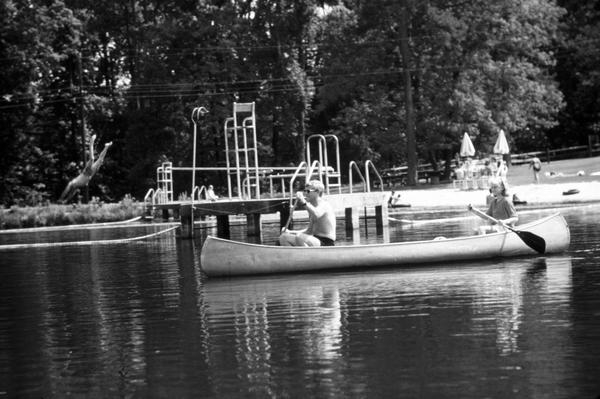October is North Carolina Archives Month, an annual observance of the agencies and people responsible for maintaining and making available the archival and historical records of our nation, state, communities and people. The 2014 NC Archives Month theme is “North Carolina at Play: Health and Leisure in Our State.” All of our Spartan Stories in October will focus on this theme.
“Tired of studying? Tired of going to classes, of going to the dining hall, of going to Aycock? Tired of your roommate? Your counselor? Yourself? … Pack up a pair of blue jeans and an old shirt, throw in a beat-up pair of sneakers, and take off to the Country Club of W.C., Piney Lake.” This begins an October 1, 1956 Carolinian article announcing the purchase and opening of the Piney Lake property to the Woman’s College students.
Piney Lake was purchased by WC on August 7, 1956 from Abe Blumenthal, a Greensboro business man who had used the property as a country estate for a number of years. For a purchase price of approximately $65,000, the college purchased the 40+ acre property situated six miles south of Greensboro. Acting Chancellor W. W. Pierson noted, “since WC trains scores of recreation directors and camp counselors, Piney Lake will be an ideal place for the more effective training of girls entering these fields of work.”
With its opening to WC students in Fall 1956, Piney Lake became the primary center for recreation activities. Students were able to make use of the four-acre lake, which featured a concrete pier, aluminum boats, and a concrete float with regulation fixtures. The grounds also featured a number of buildings and other structures for students to use, including a large residence, a caretaker’s home, a barn, a garage, a recreation pavilion, tennis courts, and dressing rooms. The Carolinian article even notes that the main residence housed a baby grand piano, “a feature which will appeal to tired music majors who desire to take a businessman’s holiday.”
Marjorie Leonard, a professor in the Department of Physical Education, and her “cocker spaniel and watchdog” Liz were the first permanent residents at Piney Lake, living in the caretaker’s house.She took on the role of “area supervisor.” While carrying a full teaching load, Leonard organized use of the Piney Lake facilities, cared for the grounds, and managed supplies and other needed items.
In addition to serving as a recreation center for student activities, Piney Lake was an instructional hub for a number of disciplines. Junior Physical Education majors spent weeks at Piney Lake at “Major Camp,” training in recreation management and education. In the summer of 1957, 13 WC students and 18 members of fifth and sixth grade classes at the Curry School participated in a week-long camp at the site. This experimental “enrichment class” consisted of courses in soil conservation, water biology, forestry, wildlife, nature study, boating, swimming, and crafts. Most of the classes were taught by the WC students or faculty members. Day camps continued for many years, opening to children of summer school students, faculty, Curry students, and the community at large.
Piney Lake was managed by the Department of Health, Physical Education, and Recreation (HPER) from its opening until 1976. After nearly twenty years of management by part-time staff, in Spring 1975, the decision was made by head of HPER to hire a full-time director for Piney Lake at the salary of approximately $10,000 per year. Soon thereafter, management responsibilities transferred to the Department of Recreation, Parks, and Tourism in 1976, but programming and use of the facilities remained the same. In fact, in 1979, Piney Lake was one of only six sites in the nation to be designated a National Environmental Study Area (NESA) by the U.S. Park Service. This designation recognized UNCG’s use of Piney Lake to provide “exemplary programs in environmental education.”
Questions over the use and funding of the Piney Lake facilities came to light in the 1990s, however. In September 1995, a consultant’s report on student activity fee issues concluded that Piney Lake should be state or self-supported, not supported by student activities fees as it had been since its inception. Dean Robert Christina of the School of Health and Human Performance responded in November, declaring that “Piney Lake is a recreation center that has no academic program.” In June 1996, the Chancellor officially responded to the report, indicating that Piney Lake should become self-supported by user fees over a five-year period. This transition, however, was not smooth. In January 2001, Piney Lake closed for all but Team Quest use. No summer camps were held for the first time since Piney Lake came into university hands
On July 1, 2001, administration of the facility was transferred to Campus Recreation, and three years later, “informal recreation” was re-established at Piney Lake. Today, Piney Lake remains under the administration of Campus Recreation, and student organizations, departments, and other groups are able to reserve the facilities for their use.
Article by Erin Lawrimore


